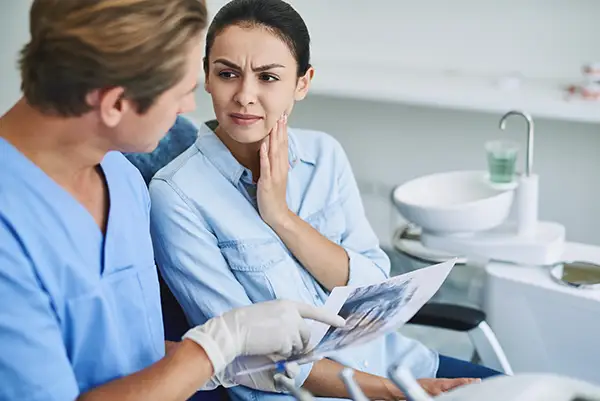Would You Recognize a Tmj Problem?
Posted on 9/15/2025 by Djawdan Center |
 Have you been experiencing any of these symptoms: Have you been experiencing any of these symptoms:
| • |
Jaw pain or clicking |
| • |
Headaches |
| • |
Earaches |
| • |
Difficulty chewing |
| • |
Limited jaw movement |
If so, you may be suffering from a TMJ problem, which stands for Temporomandibular Joint Disorder. The TMJ is the hinge connecting your jawbone to your skull, and it allows you to open and close your mouth, chew, and talk.
Problems with the TMJ can occur for a variety of reasons, including arthritis, jaw injury, teeth grinding (bruxism), and misalignment of the teeth or jaw. These problems can cause pain, discomfort, and difficulty with daily activities.
If you think you may have a TMJ problem, it's important to see an oral and maxillofacial surgeon for an evaluation. An oral surgeon is a specialist who is trained in the diagnosis and treatment of problems with the mouth, jaws, and face.
During the evaluation, your oral surgeon will ask you about your symptoms and medical history. They will also perform a physical examination of your jaw and face. In some cases, they may also order imaging tests, such as an X-ray or MRI, to get a better look at your TMJ.
If your oral surgeon diagnoses you with a TMJ problem, they will work with you to develop a treatment plan. Treatment options may include:
| • |
Oral care: This may involve using a mouth guard to protect your teeth from grinding at night, or practicing relaxation techniques to reduce stress and tension in your jaw muscles. |
| • |
Restoration dentistry: If your TMJ problem is caused by misalignment of your teeth or jaw, your oral surgeon may recommend restorative dentistry procedures, such as crowns, bridges, or orthodontics, to correct the alignment and restore the proper function of your TMJ. |
| • |
Medication: Your oral surgeon may prescribe medications to help reduce pain and inflammation. |
| • |
Physical therapy: In some cases, physical therapy can help to strengthen the muscles around your TMJ and improve range of motion. |
| • |
Surgery: Surgery is rarely necessary for TMJ problems. However, in some cases, your oral surgeon may recommend surgery to repair damaged cartilage or to correct a structural problem with your TMJ. |
The most common symptoms of TMJ are pain and clicking in the jaw joint. However, other symptoms that may be associated with TMJ disorders include:
| • |
Headaches |
| • |
Earaches |
| • |
Difficulty chewing |
| • |
Limited jaw movement |
| • |
Facial pain |
| • |
Neck pain |
If you are experiencing any of these symptoms, it is important to see an oral and maxillofacial surgeon for an evaluation. Although TMJ disorders can cause significant pain and discomfort, most cases can be successfully treated with non-surgical methods such as those discussed above.
By working closely with your oral surgeon, you can develop a treatment plan that will help you manage your symptoms and improve your overall oral health and quality of life.
|
|
